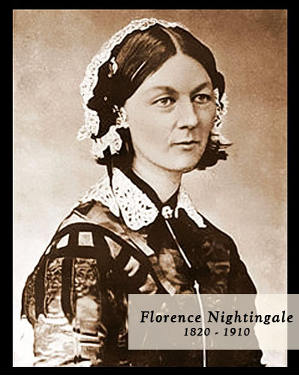This Day in History: May 12, 1820
Additional Date: May 12, 1820
Florence Nightingale was born on 12 May 1820 in Florence, Italy. From an early age, she felt it was her calling to become a nurse, but mainly due to class and gender prejudices, Nightingale only trained to become a nurse when she was thirty-one years old.
Nightingale led a group of nurses working at a military hospital during the Crimean War at Scutari, Turkey. She was appalled by the conditions in the hospital and began gathering extensive statistics about the health of the soldiers she treated. She often worked around the clock and visited her patience late at night carrying a lamp for light. This resulted in her nickname 'the lady with the lamp' (see figure 1).
Nightingale began fighting for the conditions in the hospital to improve, which was met with much resistance. Eventually however, thanks to her contacts at The Times newspaper, Nightingale was given the task of improving the quality of the sanitation in the military hospital. She was therefore able to dramatically reduce the death-rate of her patients, and this began a life-long effort to better health by improving the treatment environment.
In order to share her opinions on health reform, Nightingale published two books, Notes on Hospital (1859) and Notes on Nursing (1859). With support, Nightingale was able to raise £59,000 to improve the quality of nursing. In 1860, she used this money to found the Nightingale School & Home for Nurses at St. Thomas's Hospital. She also became involved in the training of nurses for employment in the workhouses that had been established as a result of the 1834 Poor Law Amendment Act.
Nightingale also held strong opinions on women's rights. In her book Suggestions for Thought to Searchers after Religious Truths (1859) she argued strongly for the removal of restrictions that prevented women having careers.
In later life, Nightingale suffered from poor health and in 1895 went blind. A statistician and epidemiologist, she died on 13 August 1910.
Today, International Nurses Day is celebrated around the world every 12 May, the anniversary of Florence Nightingale's birth. Nightingale made a significant contribution to nursing internationally; by raising the status of nursing as a desirable occupation, raising educational standards for nurses and improving health care standards in general.
International Nurses Day is celebrated to remember all of the valuable contributions nurses make to society. Even today, nurses in South Africa still undertake to honour the oath of Florence Nightingale (related link: SA Nursing Council).
References:
Wallis, F. (2000). Nuusdagboek: feite en fratse oor 1000 jaar, Kaapstad: Human & Rousseau.
"Florence Nightingale, biography" [online] Available at: spartacus.schoolnet.co.uk [Accessed 5 May 2009]
"International Nurses Day is celebrated on the 12th of May, Florence Nightingales birthday" [online] PDF Available at: rah.sa.gov.au [Accessed 5 May 2009]
